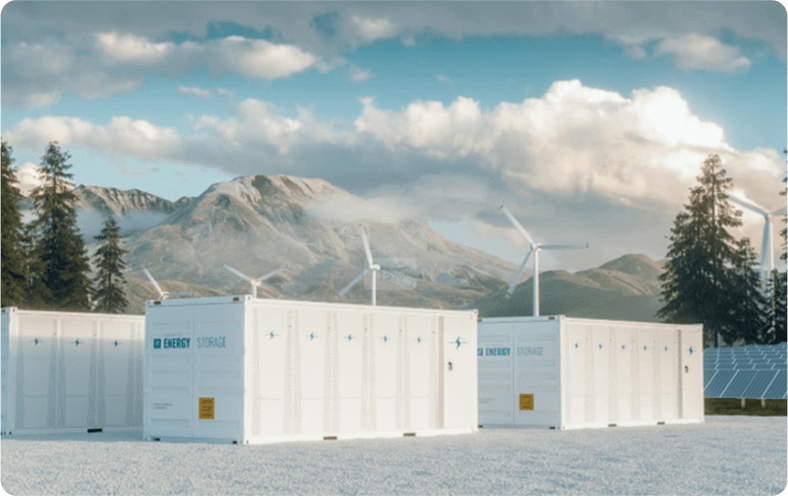Mar. 25, 2025
In battery energy storage system (BESS) design, thermal management is a critical factor affecting performance, lifespan, and safety. Currently, liquid cooling and air cooling are the two dominant thermal management solutions. This article provides a technical comparison of their advantages and disadvantages to assist engineers in making informed decisions.
1. Liquid-Cooling Energy Storage Systems
Advantages
- Superior Heat Dissipation: Liquids have a higher specific heat capacity than air, enabling faster and more uniform heat removal—ideal for high-energy-density batteries (e.g., 300Ah+ large cells).
- Precise Temperature Control: Typically maintains battery pack temperature fluctuations within ±3°C, extending cycle life (NMC batteries can achieve 10-20% longer lifespan compared to air cooling).
- Higher Space Efficiency: Eliminates the need for large air ducts, making it suitable for compact setups like containerized energy storage.
- Low Noise: No high-speed fans, with noise levels typically below 65dB, ideal for residential or indoor installations.
Disadvantages
- Higher Costs: Requires additional components such as cooling plates, pumps, piping, and coolant, increasing initial investment by 20-30% compared to air cooling.
- Complex Maintenance: Risk of coolant leakage necessitates regular inspections of seals and coolant condition.
- Slightly Higher Energy Consumption: Pump power consumption typically accounts for 1-2% of total system energy use, though overall efficiency remains better than air cooling.
2. Air-Cooled Energy Storage Systems
Advantages
- Simple Structure, Lower Cost: Only requires fans and air ducts, reducing both initial investment and maintenance costs—ideal for budget-sensitive projects.
- High Reliability: No risk of liquid leakage, making maintenance easier, especially in colder climates.
- Rapid Deployment: No complex piping design needed, reducing installation time by over 30% compared to liquid cooling.
Disadvantages
- Limited Cooling Capacity: Relies on ambient air, leading to significantly reduced efficiency in high-temperature environments (>35°C). Temperature differentials within battery packs can exceed 10°C, accelerating degradation.
- Bulky Design: Requires ample space for air ducts, typically resulting in 15-25% lower energy density than liquid-cooled systems.
- Noise Issues: High-speed fans can generate noise levels above 75dB, which may be problematic in residential areas.
3. Selection Guidelines
| Scenario | Recommended Solution | Reason |
|---------------------------|-------------------------|------------|
| Large-scale energy storage (e.g., 100MWh+) | Liquid cooling | High energy density, long lifespan requirements |
| Commercial & industrial storage (small/medium scale) | Air cooling | Cost efficiency, suitable for moderate climates |
| High-temperature regions (e.g., Middle East, Africa) | Liquid cooling | Ensures stable cooling under extreme heat |
| Low-budget or temporary projects | Air cooling | Fast deployment, lower upfront costs |
Conclusion
Liquid cooling excels in performance, lifespan, and high-temperature adaptability but comes at a higher cost. Air cooling, on the other hand, offers cost efficiency and simplicity, making it suitable for applications with less stringent thermal requirements. As liquid cooling technology becomes more standardized (e.g., solutions from CATL and BYD), cost differences may narrow. However, current selection should still consider budget, environmental conditions, and technical needs.
For further discussion on case studies or thermal simulation methods, feel free to contact our technical team!
Related Products
Related Solutions
Hotel & Guesthouse Battery Storage Solutions
+ -SolarEast BESS provides hotels and inns with efficient, safe, and smart energy storage equipment designed to slash operational costs and meet carbon emission regulations. Our all-in-one hybrid energy storage systems seamlessly integrate with your existing solar energy storage system, leveraging advanced high voltage energy storage technology to ensure a stable 24-hour power supply.
Energy Storage Solutions for Farm & Island
+ -Whether you are looking for a reliable solar battery energy storage system for sale or a robust hybrid power network, SolarEast BESS transforms unstable grids into resilient, smart energy hubs for rural and coastal communities.
Energy Storage Solutions for Industrial Parks
+ -As a leader in electrical energy storage systems, SolarEast BESS delivers turnkey solutions—from site analysis and system design to installation and long-term O&M. Our lithium battery energy storage technology ensures high cycle life and maximum safety, providing a reliable foundation for the next generation of eco-industrial parks.
Residential Energy Storage System Solutions
+ -SolarEast's residential energy storage system, designed for homes, villas, sunrooms, and communities, stores solar energy to reduce power bills and ensure reliable day-and-night energy use.
Commercial & Industrial Storage System Solutions
+ -SolarEast BESS is a supplier of lithium iron phosphate batteries, microgrid energy, large-scale battery storage, grid-scale energy storage, high-voltage energy storage batteries, and energy storage solutions. SolarEast solar batteries and solutions are recognized and welcomed by customers worldwide. Our targets are focused on the following markets: industrial and commercial energy storage systems, Telecom Energy Storage Systems (TESS), transportation/utility energy storage, and large/medium/small backup power systems.
Utility Scale Energy Storage Solutions
+ -Optimize Energy Efficiency. Cut Costs. Embrace Sustainability. SolarEast Battery Energy Storage Systems provides customized BESS solutions for industrial parks, farm energy storage solutions, and C&I Energy Storage System to reduce peak demand charges, stabilize power supply, and enable smart energy management. Our industrial and commercial energy storage systems cover a full range of products from 30kWh to 5MWh, including small integrated energy storage devices and large customized energy storage solutions, which are widely used in microgrids, off-grid power supply, peak cutting and valley filling, demand side management and backup power.


